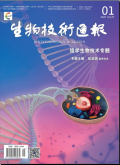生物技术通报2024,Vol.40Issue(2):253-265,13.DOI:10.13560/j.cnki.biotech.bull.1985.2023-0753
盐胁迫下氮素对花生种子萌发和种子际细菌菌群结构的调控
Regulation of Nitrogen Application on Peanut Seed Germination and Spermosphere Bacterial Community Structure Under Salt Stress
摘要
Abstract
[Objective]Salt stress affects seed germination and peanut growth,and the internal regulatory mechanism of increasing seed germination rate and peanut yield by appropriate fertilization under salt stress was elucidated,and the relationship between the process and the bacterial structure of peanut spermosphere soil was analyzed,so as to provide theoretical and technical basis for improving peanut emergence and health rate,salt tolerance and stress resistance and peanut production capacity by regulating the microenvironment in spermosphere soil.[Method]We set up three nitrogen levels of 0,90,and 180 kg/hm2 with a salt-tolerant peanut variety(Huayu 25,HY25)as experimental materials.Potted experiments and high-throughput sequencing techniques were used to study the effects of nitrogen fertilizer application on the spermosphere bacterial community structure,germination and yield of peanut under salt stress.[Result]The application of nitrogen fertilizer increased the germination rate and peanut yield,and the optimal nitrogen application was 90 kg/hm2.Proteobacteria,Actinobacteria,Firmicutes,Acidobacteria,Bacteroidetes,Chloroflexi,and Gemmatimonadetes were the dominant phyla in peanut spermosphere soil of different groups via 16S rRNA sequence.At the genus level,salt stress increased the relative abundance of beneficial bacteria Bacteroides,but induced a large number of harmful Streptococcus,whereas the relative abundance of the beneficial bacteria genera Bacillus,Sphingomonas,and Lysobacter decreased.Nitrogen application under salt stress may improve the spermosphere soil microenvironment and increase the relative abundance of beneficial soil bacteria Bacteroides,Bacillus,and Sphingomonas,which is helpful to soil restoration and fertility improvement,and can also enhance the stress resistance of peanuts.[Conclusion]Appropriate nitrogen application under salt stress increases the relative abundances of beneficial bacteria in the spermosphere soil,thus which may improve the germination rate and salt tolerance,and finally increase the peanut yield under salt stress.关键词
花生/盐胁迫/发芽率/产量/种子际/细菌菌群结构Key words
peanut(Arachis hypogaea L.)/salt stress/germination rate/yield/spermosphere/bacterial community structure引用本文复制引用
徐扬,张瑞英,戴良香,张冠初,丁红,张智猛..盐胁迫下氮素对花生种子萌发和种子际细菌菌群结构的调控[J].生物技术通报,2024,40(2):253-265,13.基金项目
国家自然科学基金项目(31971856,31901574,31971854),山东省农业科学院创新工程(CXGC2023A46),山东省现代农业产业技术体系创新团队岗位专家(花生)(SDAIT-04-06) (31971856,31901574,31971854)

